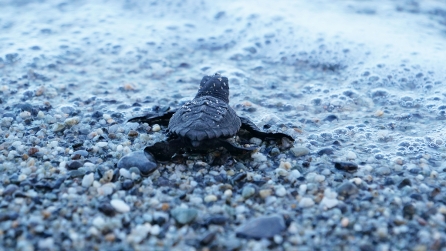Search
10/20: Partnership and synergies towards better conservation of marine biodiversity is continuing with the financial support of MAVA
With the support of the MAVA Foundation, the partnership and cooperation between national and international organisations continue in order to carry out concrete actions for the long-term conservation of marine biodiversity in the Mediterranean. Here is an overview of the most recent projects in which SPA/RAC is involved.
Marine Turtles Project phase II
The project “Conservation of marine turtles in the Mediterranean Region” aims at contributing to the effective and sustainable protection of the Mediterranean marine turtles and their habitats, mainly the Loggerhead turtle (Caretta caretta) and the Green turtle (Chelonia mydas). More specifically, the project intends to (i) sustain the regional partnership and coordination for marine turtle conservation, (ii) increase knowledge in order to create baseline for effective conservation strategies in the Mediterranean, (iii) secure the long-term buy- in for sea turtle conservation, and to (iv) scale up important marine turtle site protection.
As for the first phase of the project, the second phase is implemented by SPA/RAC (project coordinator), ARCHELON, DEKAMER, MEDASSET, MedPAN, NMPZ, WWF Greece and WWF Turkey, WWF North Africa, with the collaboration of several national partners (national institutions and agencies, NGOs). The beneficiary countries are Albania, Algeria, Egypt, Greece, Lebanon, Libya, Morocco, Spain, Tunisia and Turkey.
- Video on the Marine Turtles Project: https://youtu.be/kw2vnDEXhXA
MedBycatch Project phase II
The MedBycatch project “Understanding Mediterranean multi-taxa ‘bycatch’ of vulnerable species and testing mitigation- a collaborative approach" aims to bring together experts on fisheries bycatch, vulnerable marine species and fishing industry, conservationists, and government authorities to tackle the issue of bycatch in the Mediterranean Sea, through sustainable collection of data related to the bycatch of the vulnerable species (direct observation, questionnaires, database), analysis of the collected data, testing and implementation of appropriate bycatch mitigation measures and strategies and awareness-raising.
The project is jointly implemented by BirdLife Europe and Central Asia (Project coordinator), GFCM ACCOBAMS, SPA/RAC, IUCN Med, MEDASSET and WWF.
While the first phase of the project (October 2017 - June 2020), was implemented in Morocco, Tunisia and Turkey, the second phase of the project adds Croatia and Italy among the beneficiary countries, and the WWF joined the project regional partners team.
- Video on the MedBycatch Project: https://youtu.be/Gp_X3Y-XPQg
NTZ/MPA Project
The new project ”Co-managed No-Take Zones/MPAs” will focus on the creation of new no-take zones (NTZs) in the Mediterranean and will deliver a set of solutions to improve the management and governance of existing NTZ and MPAs. Each site will showcase specific approaches and tools to address recurrent issues in terms of governance, design, financing, and enforcement and enable inspiration and potential replication.
The project counts 8 direct partners: WWF (Lead Partner), AGIR, HCMR, LIFE, MedPAN, Notre Grand Bleu, SPA/RAC, BlueSeeds, supported by 4 indirect partners (WWF North Africa, WWF Turkey, WWF Adria, WWF Italy) and 4 associated partners (WWF Greece, WWF Spain, IUCN Med, Marilles Foundation).
Here are the countries (and sites) where activities will be implemented: Algeria (Rachgoun Island), Croatia (Molat) Cyprus (Kakoskali MPA and Chrysochou Bay), Greece (Gyaros), Italy (Torre Guaceto MPA, Pantelleria Island, S. Maria di Castellabate MPA, Capo Milazzo MPA), Malta (Il-Baħar tal-Grigal- Northeast MPA), Morocco (Al Hoceima National Park, Jbel Moussa SIBE), Spain (Cabo Cope, Cabo de Gata MPA, Sur Almería and Seco de Los Olivos, Cabo Roche, Canal de Menorca, Pitiusas Islands, Es Freus, Tagomago), Tunisia (Ghannouch, Tabarka, Kuriat Islands), Turkey (Kemer, Dilek Peninsula NP, Yumurtalik NP, Datça-Bozburun SEPA, Karaburun-Ildır SEPA, Foça SEPA).




Find Us On...